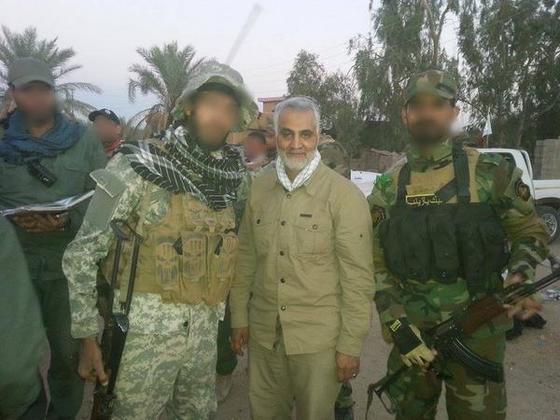Iraqi forces, Iranian-suported militias report success in Baiji

Photographs were disseminated on Twitter purporting to show
Iranian Qods Force commander Qasem Soleimani alongside Shi’ite
militiamen in Jurf al Sahkar in late October.
The Iraqi military and Iranian-backed Shiite militias are reported to have liberated the central city of Baiji from the Islamic State and are close to breaking the siege on the nearby oil refinery. The Shiite militias, which are heavily supported by Iran’s Qods Force, are playing a key role in recent gains against the Islamic State. US airpower has supported the militias and Iraqi government forces.
General Abdul Wahab al Saadi, the senior commander in the area, announced the “liberation of Baiji” earlier today on Iraqi state television, The Associated Press reported. Several Iraqi military officers also claimed success in Baiji, which hosts Iraq’s largest oil refinery.
Iraqi officials told Reuters that security forces have advanced to within one kilometer of the refinery, which has been surrounded by Islamic State fighters since the beginning of the summer. Officers claim that Islamic State fighters who are retreating are being targeted by aircraft.
Security forces and the Shiite militias have killed 17 Islamic State fighters over the past 24 hours, according to All Iraq News.
Asaib al Haq, or the League of the Righteous, a Shiite militia that is responsible for killing hundreds of US soldiers in Iraq between 2006-2011, is known to be fighting in Baiji. Al Ahad TV reported that the militia, along with Iraqi Army units, killed Ala Burhan al Tikriti, an Islamic State commander who “supervised the execution of the massacre at Camp Speicher,” an Iraqi base outside of Tikrit where hundreds of Iraqi troops were murdered. Numerous videos of the League of the Righteous fighting alongside Iraqi forces in Baiji have also been published on YouTube and other video sharing sites.
The League of the Righteous was formed in 2006 as an offshoot of Muqtada al Sadr’s Mahdi Army. The militia, which has been trained by Hezbollah and Qods Force, was the largest and most powerful of what the US military called the Special Groups, or militias backed by Iran. The group was at the forefront in using EFPs, or explosively formed penetrators, the deadly mines that can penetrate US armored vehicles. Hundreds of US soldiers were killed in EFP attacks.
Three of the group’s top leaders, including its military emir, Akram Abbas al Kabi, are listed by the US as Specially Designated Global Terrorists. [See LWJ report, US sanctions Iranian general for aiding Iraqi terror groups.]
Iranian militias spearheading Iraqi assaults against the Islamic State
The Iraqi government has grown dependent on Iranian-backed Shiite militias ever since the Islamic State launched its offensive to take large swaths of northern, central and eastern Iraq in mid-June. The Islamic State’s summer offensive, combined with the group overrunning most of the western province of Anbar beginning in January, cause the collapse of nearly half of Iraq’s Army divisions.
The militias deployed to Samarra, the provincial capital of Salahaddin, as the Islamic State took control of the nearby cities of Tikrit and Baiji. Samarra is home to the Al Askari Mosque, one of the most revered religious sites in Shia Islam.
Qasem Soleimani, the commander of Iran’s Qods Force, the special operations branch of the Islamic Revolutionary Guards Corps, was spotted in Samarra directing the defense of the city.
The Shiite militias were at the vanguard of the fighting in two other recent successes: driving back the Islamic State from Amerli in Salahaddin province and from Jurf al Sakhar in northern Babil province.
At the end of August, the League of the Righteous and the Hezbollah Brigades, another Iranian-supported militia, supported Iraqi troops in breaking the Islamic State’s hold on Amerli. The Hezbollah Brigades is listed by the US as a Foreign Terrorist Organization. [See LWJ reports, US airstrikes in Amerli supported deadly Shia terror group and US aided Hezbollah Brigades in breaking Islamic State siege of Iraqi town.]
At the end of October, the League of the Righteous, the Hezbollah Brigades, and the Badr Brigade, yet another Iranian-supported militia, drove the Islamic State from Jurf al Sakhar.
After the town was liberated from the Islamic State, photographs and videos of the militias celebrating the victory alongside Iraqi troops were published on the Internet. Soleimani was photographed with several members of Shiite militias in Jurf al Sahkar. One photograph purported to show Soleimani along with Hadi al Amiri, the head of the Badr Brigades, The Washington Post reported.
The US, either intentionally or unintentionally, has supported the Shiite militias’ gains. US and coalition aircraft launched multiple airstrikes in Baiji, Amerli, and Jurf al Sakhar as the militias and Iraqi forces began their offensives. Most recently, the US conducted 28 airstrikes in Baiji between Oct. 18 and Nov. 12, according to data compiled by The Long War Journal and Qualitative Military Edge.
The deployment of Iranian militias in Sunni areas such as Baiji and Jurf al Sakhar is certain to complicate the fight against the Islamic State. While the Islamic State has lost territory, the jihadist group has positioned itself as the defenders of the Sunnis against Iran and its Shiite proxies in the Iraqi government.
No comments:
Post a Comment